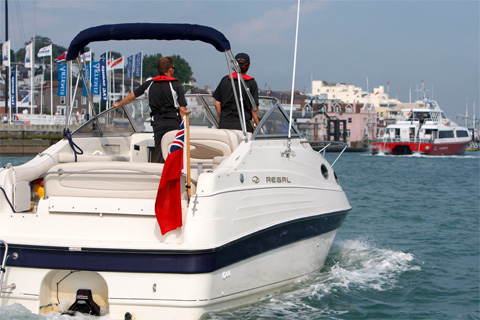Pleasure vessel regulations - Five minute briefing
A brief look at what you need to know when heading out on the water

Compared to many countries, there are few regulations concerning UK registered pleasure vessels if they stay in UK waters. So it is best to know what they are.
Now a brief definition of a pleasure vessel is one that is used for the sport or pleasure of the owner and not for financial gain. The only other real proviso here is that it does not take more than 12 passengers. There are also different regulations for vessels operating on lakes and inland waters, so we will concentrate our thoughts to boats that go to sea, which is often past the river, estuary or harbour mouth.
Racing Rules
If a boat is racing it has to comply with the requirements of the race organisers and they take their guidance from the body in charge of that type of racing. For sailing, it is the International Sailing Federation (ISAF) and for power-boating the Union Internationale Motonautique (UIM). These generic rules may then be modified slightly by National Bodies to suit their operating area. These regulations stipulate equipment and training requirements based on the length of race and type of craft.
Navigation Safety
The Merchant Shipping (Safety of Navigation) Regulations 2002 directly affect pleasure vessel users. These regulations implement SOLAS Chapter V and concern safety of Navigation. There are elements of these regulations, which apply to all vessels regardless of size.
They require a voyage to be planned, taking into account; weather, tides, limitations of vessel and crew, dangers and contingency planning. SOLAS V also requires you to have a radar reflector, carry a table of life saving signals and prohibits the misuse of distress signals.
Collision Regulations
The International Regulations for the Prevention of Collisions at Sea apply to all vessels and all persons in charge of those vessels. The regulations do not just signify who stands on and who keeps out of the way, but also specify certain lights, day shapes and fog signals for different sizes of vessels. Concessions are given as the vessel size reduces and fundamental changes take place at 12m.
Insurance
Insurance is often not a legal requirement, however you cannot use many berths without it. Moor up in a marina or on a buoy and the small print will often state that you must at least carry third party insurance. Some Harbour Authority Byelaws may also stipulate that it’s required.
Manning
Pleasure vessels under 24m are exempt from manning requirements and therefore the skipper does not require any qualification. SOLAS V however does require the voyage to be planned with due regard to the capabilities of the crew and this includes the Skipper.
If a VHF radio is carried and used, there should be a person on board qualified to operate it. This is a requirement if it is to be used for routine transmissions.
Safety Equipment
Safety equipment regulations only come into force at 13.7 m. Under the Merchant Shipping regulations, pleasure vessels of 13.7m and over are Class XII vessels which are required to comply with regulations detailing requirements for certain equipment. The distance from the coast and size of vessel dictates the type and amount of safety and fire fighting equipment required.
Marine Pollution
The International Convention for the Prevention of Pollution from Ships, referred to as MARPOL, affects all types of vessel. There are different annexes in MARPOL covering all types of pollution. The key ones affecting us are Garbage, Sewage, Oil and Emissions.
Vessels over 12m are required to carry garbage placards to notify crew of the garbage disposal arrangements. Those carrying more than 15 persons are required to have a garbage management plan and a record book if they are travelling overseas.
Any oil discharge exceeding 15 parts per million is forbidden. 15ppm is when an oil smear is visible on the water. Vessels over 24m require antifouling declarations to declare the product is safe.
Vessels with engines over 130kW require an Engine International Air Pollution Certificate and a Technical file.
As MARPOL is an International Convention, to come into force it must be implemented through national legislation. Through this process variations can occur between the legislation in different countries. This is the case with the discharge of sewage and as a result discharge of sewage regulations change with area for instance their scope differs between the Mediterranean countries and the UK. This encompasses the use of holding tanks and how far offshore certain types of sewage can be discharged.
Registration
It is not mandatory to register your boat in the UK, although some mortgage companies require it. Vessels under 24m can be issued with a MCA Certificate of Registry for either registered Pt1 (full registration) or Pt3 (small ships registration) and this helps prove vessel identity and nationality, especially Pt1. Vessels over 24m may only be registered on Pt1.
Travelling around
Local Harbour Authorities can make byelaws concerning the safety of navigation in their waters to increase the level of regulation to suit a specific need.
More information is available on the RYA website.
Written by Simon Jinks on the behalf of the RYA
Contact UsArticle Published: November 18, 2013 12:17